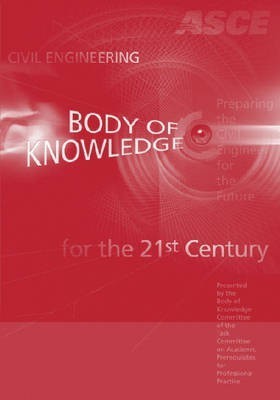Civil Engineering Body of Knowledge for the 21st Century(English, Paperback, Practice Body of Knowledge Committee of the Committee on Academic prerequisites for Professional)
Quick Overview
Product Price Comparison
The manner in which civil engineering is practiced must change. That change is necessitated by such forces as globalization, sustainability requirements, emerging technology, and increased complexity with the corresponding need to identify, define, and solve problems at the boundaries of traditional disciplines.Beginning in 1998, ASCE's Board of Direction adopted, refined, and confirmed ASCE Policy Statement (PS) 465 - ""Academic Prerequisites for Licensure and Professional Practice"" - which ""...supports the attainment of a body of knowledge (BOK) for entry into the practice of civil engineering at the professional level."" PS 465 recognizes that the profession's principal means of changing the way civil engineering is practiced lies in reforming the manner in which tomorrow's civil engineers are prepared - through education and early experience - to enter professional practice.According to PS 465, the BOK will be fulfilled by means of formal education and experience - that is, a bachelor's degree plus a master's degree, or approximately 30 semester credits, and experience. PS 465 and the foundational BOK will reform the education and prelicensure experience of tomorrow's civil engineers.""Civil Engineering Body of Knowledge for the 21st Century: Preparing the Civil Engineer for the Future, Second Edition"", focuses on outcomes to the proposed changes in the way civil engineering is taught and learned, including the knowledge, skills and attitudes necessary for entry into professional practice. The report also offers valuable guidance for faculty, students, engineer interns, and practitioners.The proposed changes to civil engineering education in ""Civil Engineering Body of Knowledge for the 21st Century: Preparing the Civil Engineer for the Future, Second Edition"", will greatly improve the preparation of civil engineers for the profession.


